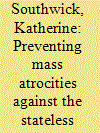|
|
|
Sort Order |
|
|
|
Items / Page
|
|
|
|
|
|
|
| Srl | Item |
| 1 |
ID:
189101


|
|
|
|
|
| Summary/Abstract |
In the contemporary digital age, mass atrocity crimes are increasingly promoted and organized online. Social media, encrypted chatrooms and messaging apps have been employed (by regimes and non-state actors alike) to stoke racial and political division, recruit sympathizers and facilitate atrocities. At the same time, there is increasing evidence of the power and promise of offensive cyberspace operations in conflict. Despite the parallel attention afforded to atrocity prevention and cyber operations (respectively), the overlap between these two scholarly investigations is thin. In fact, almost no attention has been afforded to the question of whether proactive cyberspace operations might be used for human protection purposes—specifically, to prevent genocide, war crimes, crimes against humanity and ethnic cleansing. In this article, I introduce the concept of ‘cyber humanitarian interventions’—the use of sophisticated cyber operations to frustrate perpetrators' means and motivations for mass atrocities—as a new tool in the atrocity prevention toolbox. This article therefore seeks to initiate a research agenda that considers how cyber humanitarian interventions could be used for human protection in the twenty-first century. Such an investigation is particularly timely and policy relevant, as international responses to violence have been mixed, and—in the absence of political will for costly armed military interventions—many atrocities continue unabated.
|
|
|
|
|
|
|
|
|
|
|
|
|
|
|
|
| 2 |
ID:
138413


|
|
|
|
|
| Summary/Abstract |
This article constitutes a call for solutions to the prolonged and worsening plight of the Rohingya, a largely stateless, Muslim minority based in western Myanmar. Over the past year, a number of experts have invoked the possibility of genocide against this group, citing a dangerous combination of ethnic and religious tensions, discriminatory deprivation of basic rights, restricted access to food and medicine, hate speech, and large numbers fleeing the country. Yet up to now, domestic and international responses to the Rohingya crisis have been weak, with serious consequences for this community, the prospects of democratic transition and rule of law in Myanmar, and the integrity of international law. This article highlights the basis for why the possibility of genocide has been raised and argues that the international community has legal obligations to act. These considerations could contribute to sharpening focus on the urgent need for regionally coordinated solutions, based on enforceable principles of nondiscrimination and inclusion, specifically guarantees of citizenship rights and protection. These are critical elements of democratic development in divided societies like Myanmar.
|
|
|
|
|
|
|
|
|
|
|
|
|
|
|
|
|
|
|
|
|